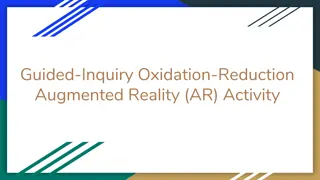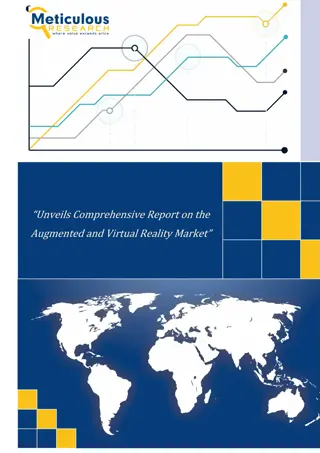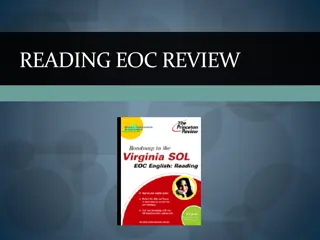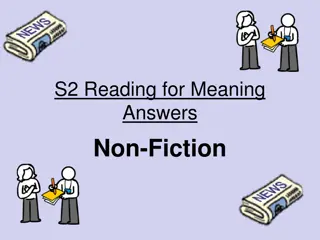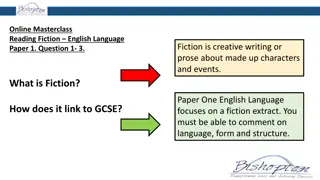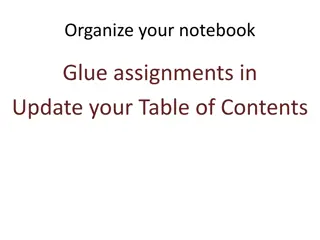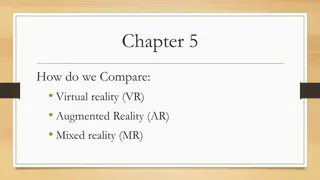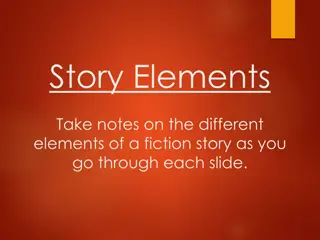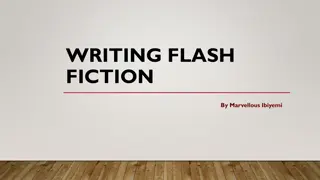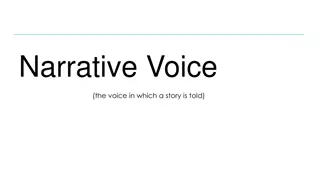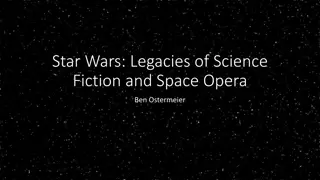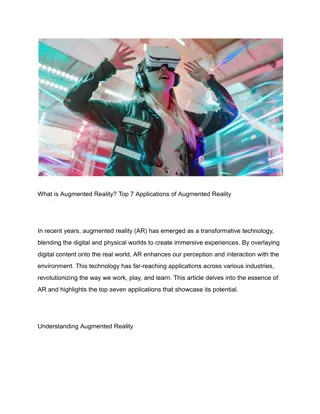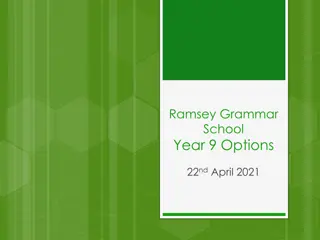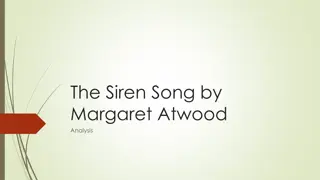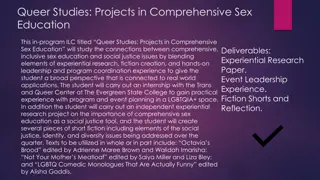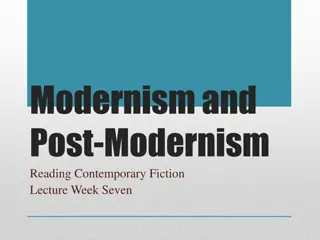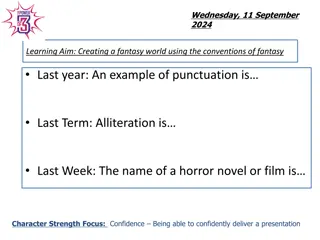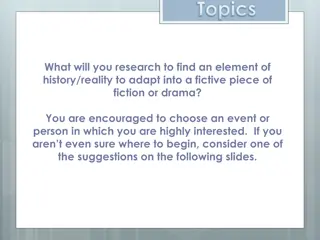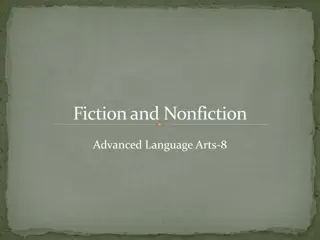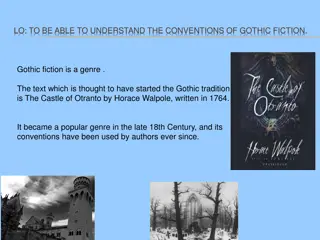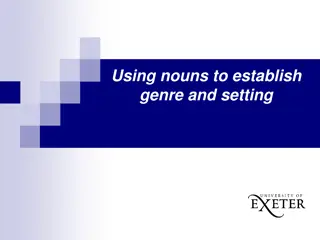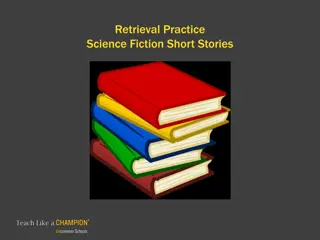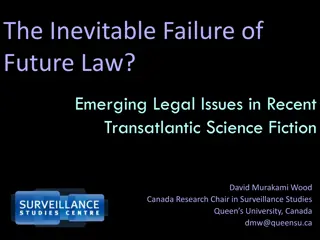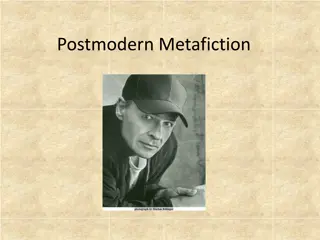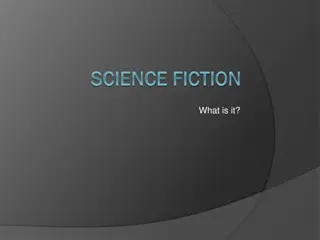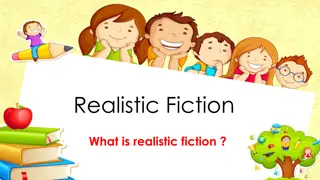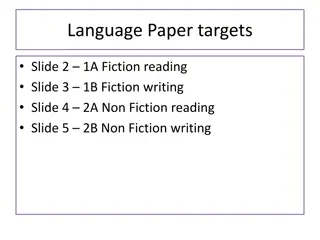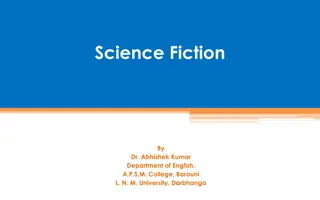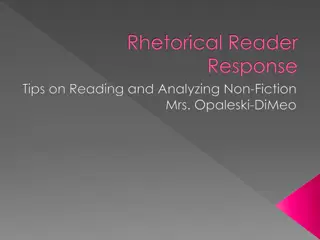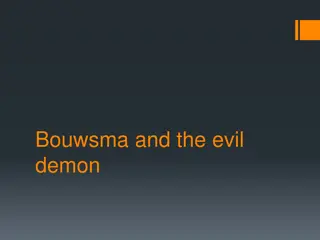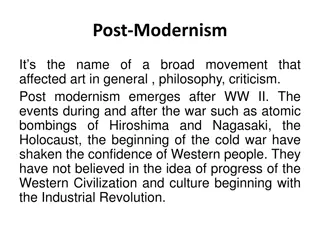Augmented Reality & Virtual Reality
The concepts and applications of augmented reality and virtual reality in the Department of Computer Science & Electronics. Discover the benefits and limitations of these technologies.
8 views • 14 slides
Exploring the Intersection of Technology and Entertainment
The entertainment landscape is constantly evolving, propelled by technological advancements that redefine \nhow we engage with stories and immerse ourselves in fictional worlds. While Virtual Reality (VR) offers \ncomplete immersion in a digital environment, and Augmented Reality (AR) overlays digit
2 views • 3 slides
Evolution of Virtual Reality: Past, Present, and Future Insights
Discover the intriguing history and definitions of Virtual Reality (VR) in this comprehensive lecture. From Burdea's components of VR to Sutherland's vision of the Ultimate Display, explore the essence of immersive experiences and the fusion of technology and human interaction. Uncover the transform
2 views • 40 slides
Exploring Citizen Journalism and Non-Fiction Writing
Explore the world of citizen journalism and non-fiction writing, learning about text types, adapting writing to conventions, considering audience, purpose, and tone. Discover the significance and usefulness of non-fiction writing, and delve into creating various text types. Uncover the role of citiz
1 views • 11 slides
Perspectives on Reality: Idealism vs. Materialism in Philosophy
Philosophy delves into fundamental questions about existence and reality. This lecture explores contrasting viewpoints of idealism, which posits that reality is mental, and materialism, which argues reality is physical. Examples from philosophers like George Berkeley and Karl Marx exemplify these pe
1 views • 12 slides
Augmented Reality Oxidation-Reduction Activity Breakout Session
Engage in an interactive guided inquiry session on oxidation-reduction reactions using augmented reality technology. The session includes team tasks and discussions related to lithium-ion electric car batteries, with designated roles for each member. Participants will access Google Docs for collabor
10 views • 8 slides
The Impact of Reality Television on Society
Reality television, where fact is sometimes stranger than fiction, has a significant influence on society. This form of entertainment often showcases ordinary people in various scenarios, leading to desensitization and acceptance of negative behaviors like aggression and bullying. The ethical implic
7 views • 17 slides
Vinz Global's Expertise in Mixed Reality Game Development
The impact of Vinz Global's mixed reality & game development initiatives is evident in the immersive and engaging experiences it delivers to players worldwide. By pushing the boundaries of technology and creativity, Vinz Global inspires imagination, fosters learning, and entertains audiences of all
4 views • 4 slides
Unveils Comprehensive Report on the Augmented and Virtual Reality Market
Augmented and Virtual Reality Market by Type (Augmented Reality, Virtual Reality), Offering (Hardware, Software), Device (AR Devices, VR Devices), Application (Health and Safety, Training), End-use Industry and Geography - Global Forecast to 2030\n
0 views • 4 slides
Reading EOC Review: Test Structure, Types of Selections, and Breakdown
The Reading EOC Review covers the test makeup, types of reading selections, and breakdown of questions and content to help you prepare effectively. The test comprises sections with 55 scored questions to be answered, focusing on functional literacy and narrative/fiction elements, including poetry, p
8 views • 26 slides
Exploring Contemporary Non-Fiction Themes
Delve into diverse non-fiction topics such as pet pampering, societal contradictions in teen reading habits, environmental concerns like plastic pollution, and societal opinions on education and lifestyle choices. Discover intriguing discussions and thought-provoking insights in this engaging collec
0 views • 55 slides
Understanding Fiction Through Text Analysis: Paper 1 English Language Masterclass
Delve into the world of fiction through an analysis of the novel "Girl With a Pearl Earring". Explore how language, form, and structure are used in the extract to captivate readers. Discover the characters, setting, and narrative techniques employed by the writer to engage and intrigue readers. Unco
2 views • 7 slides
Exploring Historical Fiction: Elements and Examples
Discover the essence of historical fiction, its key elements, and examples like "Forrest Gump." Learn how plausibility and interpretation play pivotal roles in creating captivating narratives that blend fiction with historical events.
0 views • 11 slides
Spring 2015 English 110 Final Exam Information
Spring 2015 English 110 Final Exam includes an Essay Final Exam to be completed by May 21st and an Objective Final Exam on May 27th or May 28th. The Essay Final consists of flash fiction tasks, literary criticisms, and analysis, while the Objective Final covers fiction elements identification and an
0 views • 7 slides
Comparing Virtual Reality (VR), Augmented Reality (AR), and Mixed Reality (MR)
Virtual Reality (VR) immerses users in a digital environment using headsets, Augmented Reality (AR) overlays computer-generated content on the real world, and Mixed Reality (MR) combines digital content with real-world interactions through wearable devices like glasses. VR isolates users, AR enhance
1 views • 22 slides
Essential Elements of Fiction Storytelling
Dive into the key components that make up a compelling fiction story, including plot development, setting, mood creation, character conflicts, and the use of imagery and dialogue to enhance the reader's experience. Explore these foundational elements to enhance your storytelling skills.
1 views • 36 slides
Crafting Compelling Flash Fiction: Techniques and Examples
Dive into the world of flash fiction with this informative piece detailing the essence, types, and techniques of writing succinct yet gripping stories. Learn how to hook readers from the start, use impactful scenes over summaries, and create lasting impressions with minimal words.
0 views • 18 slides
Understanding Narrative Voice in Fiction Writing
Explore the elements of narrative voice in fiction writing, including tense, perspective, and language choices. Learn how authors decide on the tense and perspective for their stories, and consider different language styles that suit various characters and perspectives. Discover the nuances of first
1 views • 7 slides
Influential Works in Science Fiction and Space Opera Literature
Explore the significant influence of classic science fiction novels like "War of the Worlds," "A Fighting Man of Mars," "Second Foundation," "2001: A Space Odyssey," and "Children of Dune" on the creation of iconic space opera narratives such as Star Wars. Delve into the themes, settings, and charac
0 views • 16 slides
What is Augmented Reality? Top 7 Applications of Augmented Reality
In recent years, augmented reality (AR) has emerged as a transformative technology, blending the digital and physical worlds to create immersive experiences. By overlaying digital content onto the real world, AR enhances our perception and interactio
0 views • 5 slides
English Language Cambridge IGCSE Course Overview
Students of the Ramsey Grammar School Year 9 English Language Cambridge IGCSE course will engage in reading and analyzing various fiction and non-fiction texts, honing comprehension skills, crafting written pieces with clarity and purpose, and enhancing their ability to summarize and re-imagine cont
1 views • 7 slides
Margaret Atwood's Analysis of "The Siren Song
Margaret Atwood, a renowned Canadian author, delves into the plight of humans through speculative fiction with elements of dystopia and science-fiction. She is an environmentalist who addresses issues like global warming in her works. Atwood's writing style includes free verse poetry with enjambment
16 views • 18 slides
Exploring Comprehensive Sex Education and Social Justice Connections
This program, "Queer Studies: Projects in Comprehensive Sex Education," delves into the intersection of inclusive sex education and social justice issues through experiential research, fiction creation, and hands-on leadership experiences. The student will intern at the Trans and Queer Center, condu
1 views • 6 slides
Insights into Realism and its Critiques in Literature
Exploring the dominance of realist fiction in European literature, this content delves into the evolution of realism during the Enlightenment period, emphasizing its focus on mimicking social reality. It details the concept of mimesis and verisimilitude in creating a realistic narrative structure th
0 views • 19 slides
Exploring Fantasy Worlds: Conventions, Types, and Challenges
Dive into the realm of fantasy literature and learn about the conventions, types, and differences between fantasy and sci-fi. Uncover the definition of fantasy, explore popular genres, and discover sub-genres like fiction, science fiction, and historical fiction. Engage in thought-provoking challeng
0 views • 17 slides
Washington Irving: Father of American Fiction and Pioneer of American Romanticism
Washington Irving, an influential American author of the early 19th century, is revered as the Father of American fiction. Known for iconic works like "The Legend of Sleepy Hollow" and "Rip Van Winkle," Irving played a crucial role in establishing American literature as an independent art form. His
1 views • 14 slides
Historical Trials Reimagined: From Fact to Fiction
Explore how real-life American trials, tragedies, and disasters have inspired works of fiction, delving into the creative transformation of historical events into captivating narratives that resonate with audiences. From the Salem Witch Trials to the Civil War era and modern tragedies like 9/11, wit
0 views • 12 slides
Understanding Fiction and Nonfiction in Language Arts
Fiction and nonfiction are two key genres in literature. Fiction involves imaginative storytelling with elements like plot, characters, setting, point of view, and theme. Nonfiction, on the other hand, deals with real people, events, and ideas, aiming to inform, persuade, or entertain readers. Explo
0 views • 14 slides
Understanding Gothic Fiction Conventions in Literature
Gothic fiction is a captivating genre rooted in dark, mysterious settings, supernatural elements, and eerie atmospheres. Originating with "The Castle of Otranto" by Horace Walpole, this genre has evolved to encompass elements like family curses, isolated castles, and sinister creatures. Dive into th
0 views • 25 slides
Creative Noun Usage in Science Fiction Writing
Explore the art of using nouns to establish genre, setting, and character names in science fiction writing. Learn how authors like Philip Reeve utilize proper nouns to create immersive worlds and unique characters. Delve into the significance of authentic text, discussion, and purposeful learning pr
0 views • 10 slides
Science Fiction Retrieval Practice: Short Stories Insights
Explore futuristic technologies, incongruity, and speculative fiction elements in science fiction short stories like "Robbie" and "There Will Come Soft Rains." Uncover the connections to historical events, like the Cold War, through literary analysis of these captivating narratives.
0 views • 16 slides
Exploring Legal Themes in Science Fiction: The Inevitable Failure of Future Law
This study delves into emerging legal issues in recent transatlantic science fiction works by authors like Charles Stross, Ken McLeod, and Paolo Bacigalupi. It examines the portrayal of law in SF and what insights it offers about our legal systems. Through a systematic survey of over 300 novels and
0 views • 12 slides
Exploring Postmodern Metafiction in Literature and Architecture
Postmodern metafiction in literature and architecture challenges traditional storytelling and design by emphasizing artificiality and self-reflexivity. It delves into the construction of narratives and buildings, breaking the fourth wall to highlight the role of language and storytelling in shaping
0 views • 7 slides
Exploring the World of Science Fiction
Science fiction is a genre that delves into imagined future scientific and technological advances, exploring major societal and environmental changes, space travel, time travel, and life on other planets. It combines elements of science and fiction to create believable yet captivating narratives tha
0 views • 14 slides
Understanding Realistic Fiction: Features and Examples
Realistic fiction is a genre of writing that portrays characters, settings, and events that could exist in real life, even though the story itself may be fictional. The key features include believable characters, realistic settings, everyday problems, and plausible solutions. By sorting book covers
0 views • 9 slides
Language Paper Targets for Fiction and Non-Fiction Reading and Writing
This content provides detailed targets for Language Papers, focusing on Fiction and Non-Fiction reading and writing skills. It covers strategies such as being specific in analysis, using evidence from texts, improving sentence structures, enhancing vocabulary usage, and applying language techniques
0 views • 14 slides
Evolution of Science Fiction Literature
Science fiction genre, blending imaginative fantasy with scientific principles, has evolved significantly over time. Initially emerging in the late 1800s, it gained popularity alongside technological advancements. Theodore Sturgeon highlighted the essence of human stories within the genre. Iconic wo
0 views • 8 slides
Effective College Reading and Analysis Strategies for Non-Fiction Texts
Enhance your non-fiction reading and analysis skills with these practical tips: prepare yourself mentally before reading, preview the article, highlight key points while reading, monitor comprehension, and summarize the article afterward. Additionally, learn how to create a rhetorical précis to eff
0 views • 19 slides
Understanding Illusions and Reality in Philosophical Thought
Explore Bouwsma's philosophical insights on illusions and reality through scenarios involving an evil demon and a deceptive world. Learn how individuals can distinguish between illusion and reality in thought experiments involving deception and perception.
0 views • 28 slides
Understanding Post-Modernism: Art, Philosophy, and Criticism After WWII
Post-Modernism emerged in the aftermath of WWII, challenging traditional beliefs in progress and shaping a new perspective on chaos, reality, and fiction in art, philosophy, and social systems. It blurs boundaries between high and low art forms, explores metafiction and pastiche, and emphasizes the
0 views • 6 slides





